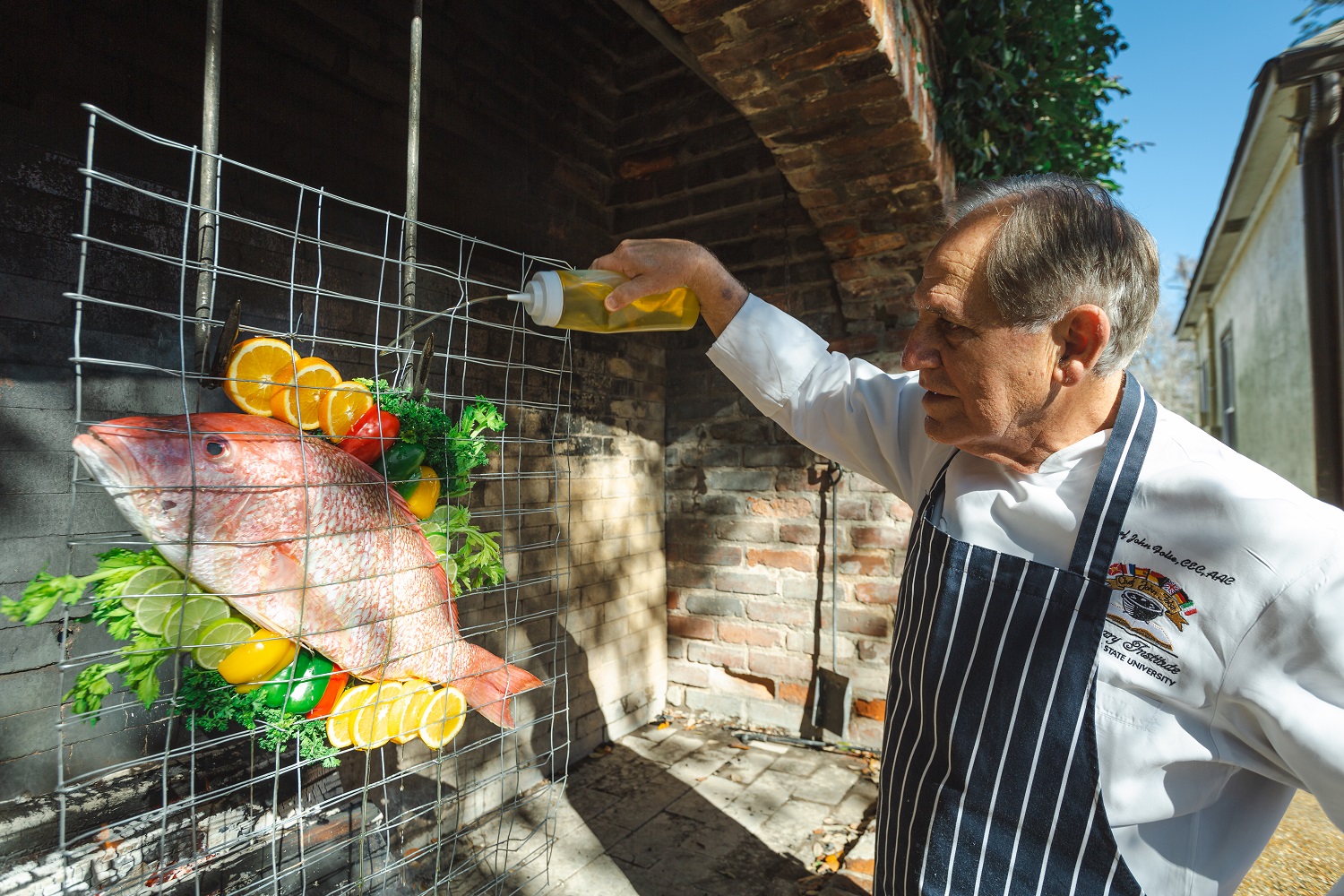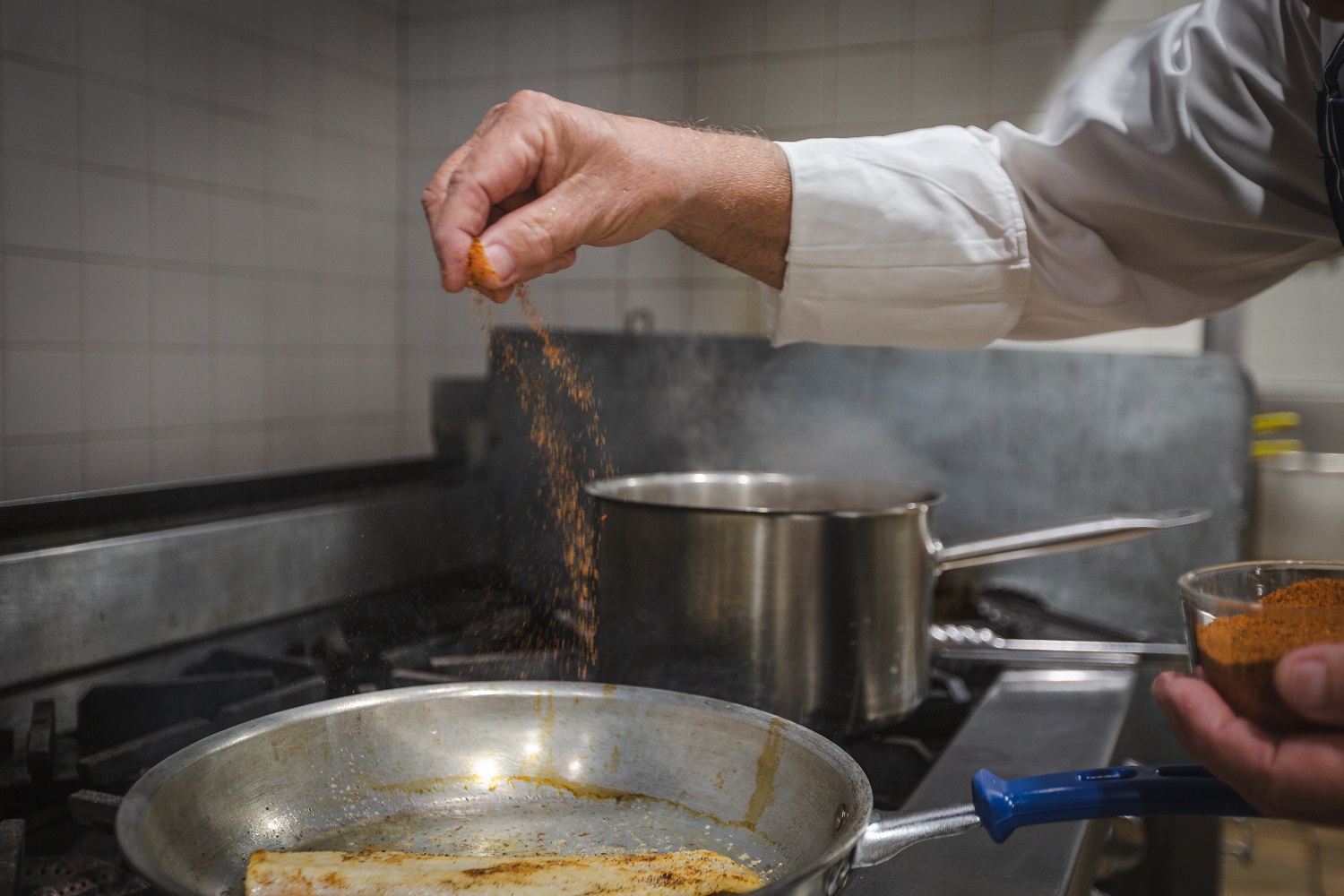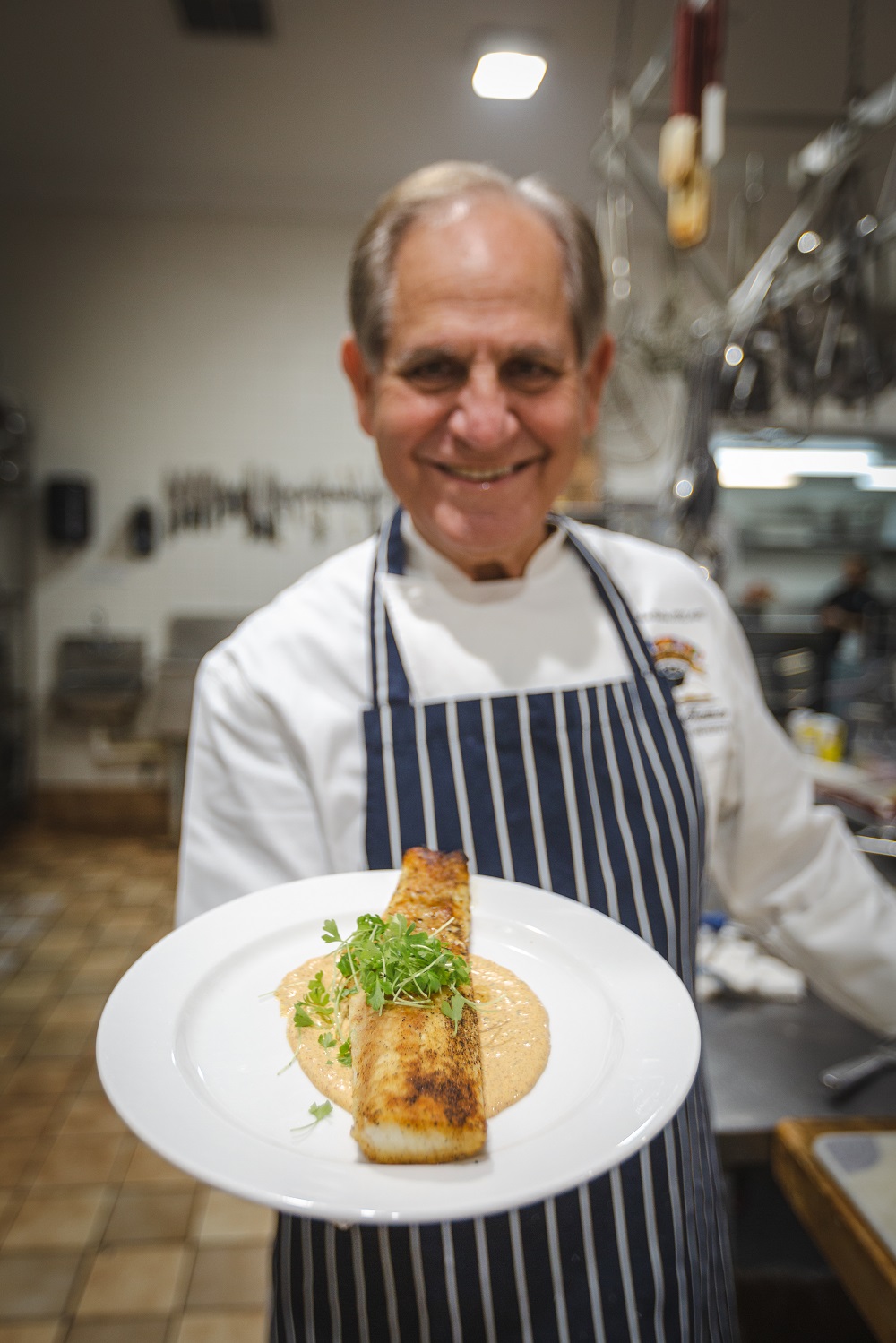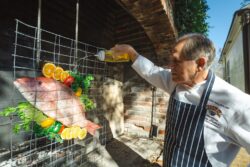Sharing the Range
Chef John Folse is the LEH’s 2023 Humanist of the Year
Published: May 31, 2023
Last Updated: August 31, 2023

Photo by Lucie Monk Carter.
Folse seasons a red snapper cooking in an outdoor grate.
Watching you cook just now, I can see you know how to move around the kitchen when a camera’s on you. Were you always that comfortable?
Chefs in general . . . mentally we’re artists. We’re always thinking about our environment. We’re always thinking about the kitchen as our stage. Whether we’re in there alone and just creating a new dish, or whether there’s people watching us, or whether there’s young chefs who’re learning from us, I think we’re just always excited to be sharing the range.
How did you first take Louisiana cuisine to an international level?
My first voyage overseas was when a group of Japanese businessmen came to Lafitte’s Landing Restaurant and had lunch. I’ll never forget this—coming up to the table after and saying, “How was everything?” And they said, “Oh, it was just fantastic. And we just loved the whole scene here. How do we get this to Japan?” I said, “I guess we’d get that by plane or something,” [laughing] “[that’s] how we’ll get there. Who are you anyway?”
He said, “Well, I’m the president of Hilton International out of Hong Kong.”
That was my first indication that there was something really special about Louisiana, and that we had something that maybe the world would be interested in.
We ended up taking Lafitte’s Landing to what, seven or eight countries? We got the attention of the media and the chefs and everybody else, and I said, we really do have something special here in Louisiana. I mean, to open in Moscow, to open in China, to be the first non-Italian chef to do a Vatican State Dinner for the Holy Father. I’ll never forget when I walked up to the table of Reagan, Gorbachev, Nancy [Reagan], and Raisa [Gorbachev, at the 1988 Presidential Summit]. I’m thinking to myself, how in the hell did [I] get here? It was emotional, right? This is impossible, to be here. Here’s the two most powerful leaders in the world and their wives, and I’m bringing a plate of food. How did this happen?
What does this story look like when you tell it in Louisiana? How do you assert your authority?
I walked into the office one day and I said, “Michaela [York, Folse’s director of communications], we need to write the encyclopedia of Cajun cuisine.”
She was writing something and she said, “Sure, tomorrow.”
But we needed to tell the story of the Seven Nations that formed Louisiana. And of course, it ended up being what, four or five encyclopedias?
Sometimes Michaela would want to slow down or stop. I said, how can we stop? We’ve only got eighty years. We have to hurry up.
Are there other book ideas brewing?
Well, Michaela keeps saying that it’s time to write the biography, to just write the John Folse story now. But I said, “Michaela, isn’t it already written?”
She said, “The work is there, but there’s a book about—Why were you so passionate to do it? Why were you so just filled with the energy to want to do all these things you’ve done? You’ve written all these encyclopedias, and you’ve done all these PBS shows for years and years and years. You’ve opened restaurants in eight countries. When do you say Enough is enough?”
And I said, “Well, enough is when it’s done, and it’s not done yet.” I said, “Every single day my phone rings about something that somebody wants to do internationally or whatever.”

Folse cooking trout. Photo by Lucie Monk Carter.
Your culinary institute at Nicholls State University stands out as being the only four-year program in culinary arts. Why four years instead of two?
It was important to me to do a four-year degree at Nicholls because I always felt that the cook was relegated to the kitchen. And as long as we could cook, that was [considered] enough. I went to the Board of Regents and I asked about a four-year college degree in culinary [arts]. I’m standing in a room of all these PhDs at the Board of Regents. And I said, “So as long as I can cook and feed you, that’s enough. [But] what about feeding me? What about if I’m a great cook, but I can’t manage anything? I know nothing about accounting. I know nothing about marketing because you’re not giving me that. You’re giving that to your four-year student, but not to me.”
I said, “The two-year degree will only get me to open my restaurant. The four-year degree will keep it open.” And look, it’s still the only four-year college degree in the world, in culinary. That’s why we’ve got students from France and Germany. If they want a four-year degree in culinary, they’ve got to come to Nicholls. What a blessing for the state.
Speaking of restaurant struggles, can you tell me about how your operations were affected by COVID-19? What did you do to innovate or respond?
None of us were removed from the frustration and the loss of the pandemic. I think what made a lot of restaurateurs succeed was our ability to adapt in pretty frustrating times, because we’re in an industry that really constantly is bombarded with issues—with staff not showing up, cooks quitting, whatever it is. So we’re used to turmoil in our lives. But we learn a lot from our experiences.
I was sitting in my manufacturing plant in Donaldsonville one day. All my customers were gone. And Dawn Delhommer, one of the women who works in purchasing, said, “I wonder what the restaurants are doing. How are they coping? I mean, they have no staff. Who’s cooking for them?” I said, “Oh my God, that’s the answer. We have a manufacturing plant. We have two-ton kettles to make food. All the chefs are gone from TGI Fridays and Chili’s and Outback. Why don’t we just call [the restaurants] up? We’ll say, look, send me your menu. We’ll cook it here and we’ll bag it up. We’ll send you the finished product and you can open your restaurants.” And I went to [TGI] Fridays first, and Fridays jumped on it. But I got hung up on [by other restaurants] quite a bit, too.
You’ve lent your time and your celebrity status to a number of charitable organizations over the years, particularly Catholic efforts. Where does your devotion stem from?
At some point I came to realize that everybody needs somebody. When my mother died in 1955, she died in a house full of eight babies. She was thirty-five years old, and she died in childbirth. We had no doctors, nobody in the swamp. Dad was a trapper. And it was a knock on our door about two weeks later. This Black woman was standing at the door. My dad says, “Can I help you?” She said, “No, sir, but I can help you.”
Her name was Mary Ferchard. She’d seen my mother nine months pregnant, in the rain, hanging diapers on the clothesline. She helped my mother hang diapers, and Mother grabbed her hand and said, “If anything ever happens to me, I really wish somebody like you would look in on these kids.” That was a life-changing moment for all of us, because Mom died two weeks later, and Mary knocked on the door, and she was with us for twenty-two years.
I was only eight years old, but my brothers, older and younger, were big hunters. I wasn’t really interested in that. I always looking for something to do. One day Mary said, “You come help me.” The first lesson I got was cutting the roots off of a green onion.
She said, “Now just get the roots. Don’t get the onion. We need the onion.” I still remember it. She said, “You don’t have to go hunt if you don’t want to hunt. You don’t have to go fish if you don’t want to fish. You can cook with me.” And as a young kid, I started to cook with her. Of course, she was the greatest cook I ever met. And she raised her six children. She raised all eight of us.
She absolutely gave me the courage to cook and gave me something as important, if not more important: She taught me to be experimental. Because she used to say, “We don’t have a store to go to, so we have to make things good ourselves.”
How would she do that?
She’d go out into the yard and pick things that she knew would have flavor, because we lived in the swamps of Louisiana. So the Mississippi River was at our front door, and the swamps were our back door. She would go out and pick things. Back then, people had small gardens and they raised their own animals, but they were really great at foraging.
Now, once Mary was interested in me—she was a big storyteller. She was really good. Man, she could keep you going. And I realized that she was an encyclopedia. I was lucky enough to be the one that she took under her wing.

Plated trout ready to enjoy. Photo by Lucie Monk Carter.
You’ve been the recipient of Lifetime Achievement Awards and the like for thirty years now. How does that affect your daily work and outlook?
Well, I think I’m really fortunate in that I have a tremendous curiosity. I’m never bored with where I am, never. And even at my age every day, I’ll probably wake up as excited as I woke up when I was fifteen, because every day is a new opportunity for me. Every day in my life is not what I’ve done. It’s what I’m going to do.
That’s what drives me. I’m never bored with the fact that, okay, I’ve done that. Every day is a new opportunity to share something, to give something to somebody else, to be a part of something unique. And the good Lord has blessed me in a way to put me in the right place at the right time.
It’s prepared me to realize that nothing is impossible. I’m the best example of it. I’m a perfect example of it. And if you don’t believe me, just get in your car, drive to Louisiana, come spend a day with me. I’m going to show you what impossible looks like. Because I’ve done it, and I don’t know how.
But you must have some advice.
You just have to wake up even though you’re tired sometimes. And even though you might not be feeling well or whatever, you just have to wake up with the realization that there’s a lot of people depending on you. That’s really what drives me, is not so much that I need anything, but that I realize the vastness of not only the company or my own family, but the amount of people out there that really need encouragement or people out there that really need your assistance or your ability to open the door for them. I find that to be my greatest joy. My greatest joy is how somebody can walk in, sit down, and say, “Chef, can I talk to you about something?” That’s my greatest joy. God didn’t bless me with a bunch of children, but he sent me thousands of ’em. It’s a great gift. But anyway, it’s pretty simple for me. It’s really pretty simple.
Lucie Monk Carter is a writer and photographer in Baton Rouge.
